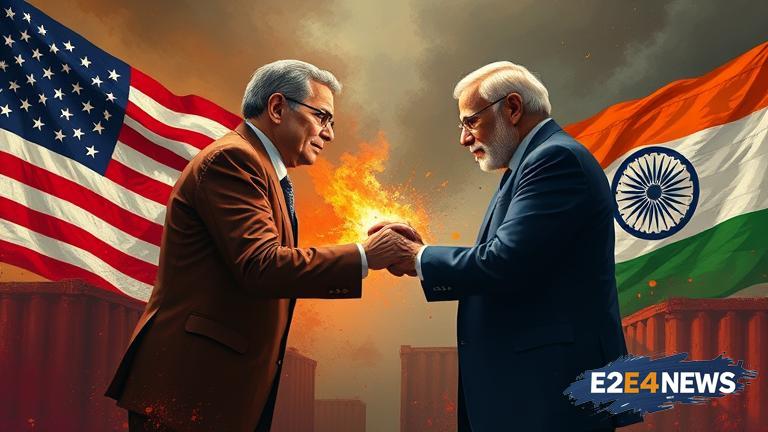The trade tensions between the United States and India have been escalating in recent months, with both countries imposing tariffs on each other’s goods. The US has imposed tariffs on Indian steel and aluminum, while India has retaliated with tariffs on US goods such as almonds and apples. The trade dispute has sparked concerns of a full-blown trade war between the two countries, which could have significant implications for the global economy. The US has been pressuring India to open up its markets to American goods, while India has been resisting, citing concerns about the impact on its domestic industries. The trade tensions have also been fueled by disagreements over issues such as intellectual property rights and market access. The US has been seeking to increase its exports to India, while India has been seeking to protect its domestic industries from foreign competition. The trade dispute has also been affected by the COVID-19 pandemic, which has disrupted global supply chains and led to a decline in international trade. The US and India have been holding talks to try to resolve the trade dispute, but so far, no agreement has been reached. The trade tensions have also been influenced by the geopolitical dynamics between the two countries, with the US seeking to strengthen its ties with India as a counterbalance to China’s growing influence in the region. India has also been seeking to strengthen its ties with other countries, including the European Union and Japan, in order to reduce its dependence on the US. The trade dispute has also had an impact on the domestic politics of both countries, with politicians in the US and India using the issue to score points with their respective electorates. The trade tensions have also been fueled by the nationalist sentiments in both countries, with many in the US and India calling for protectionist measures to protect domestic industries. Despite the tensions, both countries have been seeking to maintain a positive relationship, with the US and India cooperating on a range of issues, including defense and security. The trade dispute has also highlighted the need for greater cooperation between the two countries on issues such as trade facilitation and customs clearance. The US and India have also been discussing the possibility of a free trade agreement, which could help to reduce tariffs and other trade barriers between the two countries. However, the talks have been slow to progress, and it remains to be seen whether an agreement can be reached. The trade tensions have also had an impact on the business community, with many companies in the US and India calling for a resolution to the dispute. The trade dispute has also highlighted the need for greater transparency and predictability in trade policies, in order to help businesses to plan and invest with confidence. The US and India have also been seeking to strengthen their ties with other countries in the region, including the Association of Southeast Asian Nations (ASEAN), in order to promote greater economic cooperation and integration. The trade dispute has also been influenced by the role of other countries, including China, which has been seeking to increase its influence in the region. The US and India have also been cooperating on a range of regional issues, including counter-terrorism and non-proliferation. The trade tensions have also highlighted the need for greater cooperation between the two countries on issues such as energy and environment. The US and India have also been discussing the possibility of cooperation on issues such as artificial intelligence and cybersecurity. The trade dispute has also had an impact on the agricultural sector, with many farmers in the US and India calling for greater access to each other’s markets. The trade tensions have also been fueled by the issue of subsidies, with the US and India disagreeing over the level of subsidies that should be allowed in the agricultural sector. The trade dispute has also highlighted the need for greater cooperation between the two countries on issues such as food security and sustainable agriculture. The US and India have also been seeking to strengthen their ties with international organizations, including the World Trade Organization (WTO), in order to promote greater cooperation and stability in the global trading system.
